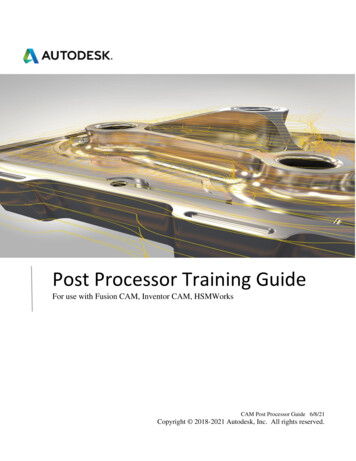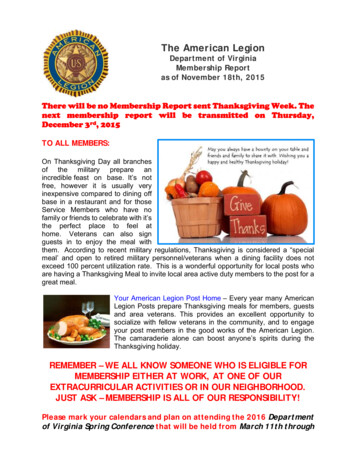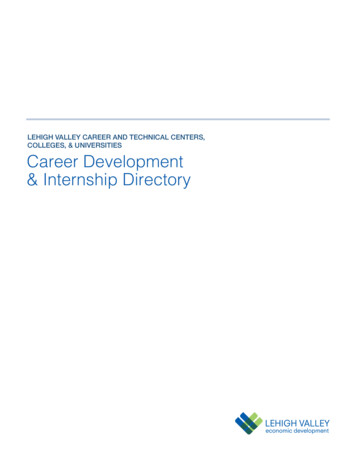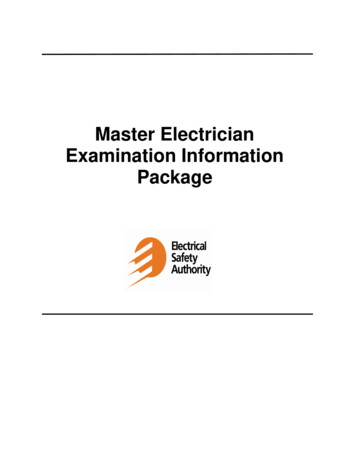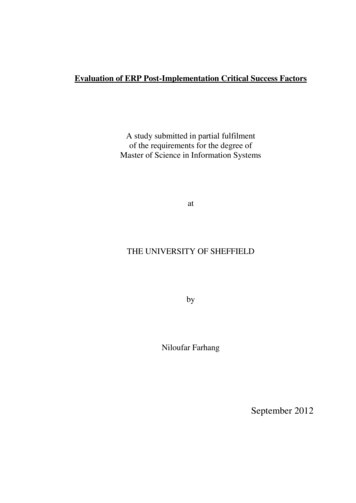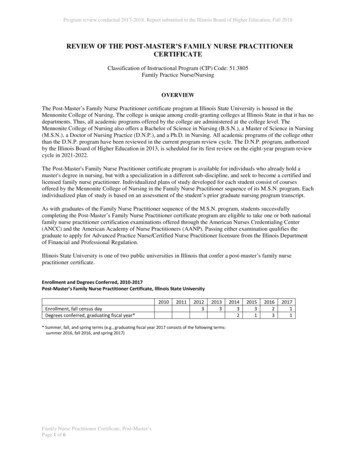
Transcription
Program review conducted 2017-2018. Report submitted to the Illinois Board of Higher Education, Fall 2018REVIEW OF THE POST-MASTER’S FAMILY NURSE PRACTITIONERCERTIFICATEClassification of Instructional Program (CIP) Code: 51.3805Family Practice Nurse/NursingOVERVIEWThe Post-Master’s Family Nurse Practitioner certificate program at Illinois State University is housed in theMennonite College of Nursing. The college is unique among credit-granting colleges at Illinois State in that it has nodepartments. Thus, all academic programs offered by the college are administered at the college level. TheMennonite College of Nursing also offers a Bachelor of Science in Nursing (B.S.N.), a Master of Science in Nursing(M.S.N.), a Doctor of Nursing Practice (D.N.P.), and a Ph.D. in Nursing. All academic programs of the college otherthan the D.N.P. program have been reviewed in the current program review cycle. The D.N.P. program, authorizedby the Illinois Board of Higher Education in 2013, is scheduled for its first review on the eight-year program reviewcycle in 2021-2022.The Post-Master's Family Nurse Practitioner certificate program is available for individuals who already hold amaster's degree in nursing, but with a specialization in a different sub-discipline, and seek to become a certified andlicensed family nurse practitioner. Individualized plans of study developed for each student consist of coursesoffered by the Mennonite College of Nursing in the Family Nurse Practitioner sequence of its M.S.N. program. Eachindividualized plan of study is based on an assessment of the student’s prior graduate nursing program transcript.As with graduates of the Family Nurse Practitioner sequence of the M.S.N. program, students successfullycompleting the Post-Master’s Family Nurse Practitioner certificate program are eligible to take one or both nationalfamily nurse practitioner certification examinations offered through the American Nurses Credentialing Center(ANCC) and the American Academy of Nurse Practitioners (AANP). Passing either examination qualifies thegraduate to apply for Advanced Practice Nurse/Certified Nurse Practitioner licensure from the Illinois Departmentof Financial and Professional Regulation.Illinois State University is one of two public universities in Illinois that confer a post-master’s family nursepractitioner certificate.Enrollment and Degrees Conferred, 2010-2017Post-Master’s Family Nurse Practitioner Certificate, Illinois State University2010Enrollment, fall census dayDegrees conferred, graduating fiscal year*20112012320133* Summer, fall, and spring terms (e.g., graduating fiscal year 2017 consists of the following terms:summer 2016, fall 2016, and spring 2017)Family Nurse Practitioner Certificate, Post-Master’sPage 1 of 6201432201531201623201711
Program review conducted 2017-2018. Report submitted to the Illinois Board of Higher Education, Fall 2018EXECUTIVE SUMMARYPROGRAM REVIEW SELF-STUDY REPORTProgram goalsThe goal of the Post-Master’s Family Nurse Practitioner certificate program is to prepare nurses with the knowledgeand skills to improve health outcomes by Advocating for compassionate patient-centered care with a commitment to serve vulnerable populations,Leading and evaluating safe and effective change for improved quality in practice and health care systems,Advancing a culture of excellence through lifelong learning and scholarly inquiry in a complex health caresystem,Applying ethical and policy analyses to assess, intervene, and evaluate care delivery in and across healthcaresystems,Fostering and leading collaborative interprofessional care teams to provide individual, family and populationbased care,Navigating and integrating services across the healthcare system that promote ethical, cost-effective, andinnovative change,Translating evidence into practice within an interprofessional healthcare system,Using communication and information technology to collaborate with healthcare consumers and providersacross the healthcare system.Student learning outcomesStudent learning outcomes associated with each program goal are set forth in learning objectives associated witheach course in the program.Program curriculum (2017-2018)Graduation requirements: At least 26 credit hours of Mennonite College of Nursing courses, including one requiredcourse in diagnostic reasoning (3 credit hours) and 23 credit hours of specialty courses. Individualized plans of studyare developed based on an assessment of each student’s graduate nursing education transcript.Program deliveryThe Post-Master’s Family Nurse Practitioner certificate program is offered on the Normal campus.All courses are delivered face-to-face.College faculty (Fall 2017)18 tenure track faculty members (4 Professors, 5 Associate Professors, and 9 Assistant Professors)55 non-tenure track faculty members (18 full-time and 37 part-time, totaling 26.36 FTE)Courses in the Post-Master’s Family Nurse Practitioner certificate program are taught by full-time tenured or tenuretrack faculty members. All tenured or tenure track faculty members in the college have a doctorate. Those teachingnursing content have either a Ph.D. or a Doctor of Nursing Practice (D.N.P.). One faculty member is a doctorallyprepared statistician who teaches statistical methods and serves as the college statistician. All tenure track facultymembers are expected to establish and implement a plan of scholarship. Peer-reviewed contributions by facultymembers have included journal articles, presentations at regional, national, or international conferences, continuingeducation publications, and grant submissions, among others. In Fiscal 2017 nursing faculty members collectivelyreceived external grants totaling 3.4 million to support research projects from Fiscal 2018 through Fiscal 2021.Family Nurse Practitioner Certificate, Post-Master’sPage 2 of 6
Program review conducted 2017-2018. Report submitted to the Illinois Board of Higher Education, Fall 2018All non-tenure track faculty members in the college are expected to possess either a master’s degree in nursing or adoctorate in nursing (either a D.N.P. or Ph.D.). Many non-tenure track faculty members supervise students atclinical sites, and full-time non-tenure track faculty members are active in service activities at the college anduniversity levels.Mennonite College of Nursing faculty members have received numerous teaching, research, and service awardsbestowed by the University or by entities external to the University since the 2009-2010 program review. Amongthe external recognitions are a Distinguished Leader Award from the Emergency Nurses Association, Book of theYear Award from the American Journal of Nursing, Article of the Year Award from the Journal of PsychosocialNursing and Mental Health Services, and an Innovations in Professional Nursing Education Award bestowed by theAmerican Association of Colleges of Nursing for faculty re-design of the pediatric clinical experience in theundergraduate nursing program.Specialized accreditationThe Post-Master’s Family Nurse Practitioner certificate program is accredited by the Commission on CollegiateNursing Education (CCNE). Other Mennonite College of Nursing programs accredited by CCNE include theBachelor of Science in Nursing (B.S.N.), the Master of Science in Nursing (M.S.N.), and the Doctor of NursingPractice (D.N.P.) A reaccreditation site visit to review the four programs occurred in spring 2017. CCNEsubsequently reaccredited all four programs for 10 years, the maximum period of accreditation granted by CCNE,through 2027.Changes in the academic discipline, field, societal need, and program demandAs healthcare becomes more complex, the demand for nurses with a graduate degree in the discipline is increasing.Demand is especially high for nurses with an advanced degree in primary care, to fill the increasing number offamily nurse practitioner positions in the field. The master’s degree continues to be the gateway credential for workas a family nurse practitioner, although more employers are expected to seek nurses with a doctor of nursing practiceto fill those positions in the next decade. A shortage of advanced primary care nurses continues among rural andtraditionally underserved populations, and the federal government provides funding to educate nurses for work withthose populations. In 2015 the Mennonite College of Nursing was named one of four preferred educational partnersin Illinois for the nearly 37,000 associates employed by Advocate Healthcare system. That system is headquarteredin Downers Grove (Illinois) and operates the Advocate BroMenn Healthcare facility in Normal. Designation as apreferred educational partner may result in higher demand for the Post-Master’s Family Nursing PractitionerCertificate program.Response to previous program review recommendationsThere were no prior recommendations for this program.Major findingsThe Post-Master’s Family Nurse Practitioner certificate program continues to provide advanced practice nursingcertification and licensure opportunities to a unique group of healthcare professionals: those who have earned amaster’s degree in nursing but in a sub-discipline other than family practice. The program is one of only two of itskind offered by public universities in the state and the only one outside the Chicago metropolitan area. Enrollment inthe program and the number of certificates conferred are low, however, because students in the certificate programenroll in the same courses as students in the Family Nurse Practitioner sequence of the M.S.N. program, noresources are needed to offer the certificate program beyond those already dedicated to the M.S.N. program. Thecertificate program continues to attract highly-qualified students dedicated to family practice nursing, as evidencedby a 100 percent program completion rate, a 100 percent pass rate on the certification examinations, and a 100percent employment rate for program graduates. Challenges identified through this program review are the same asthose of the M.S.N. program: increasing the number of full-time faculty members in the college with acorresponding decrease in the number of part-time faculty members, expanding use of clinical simulations, anddevising and implementing a plan for faculty professional development.Family Nurse Practitioner Certificate, Post-Master’sPage 3 of 6
Program review conducted 2017-2018. Report submitted to the Illinois Board of Higher Education, Fall 2018Initiatives and plans Determine and work toward the ideal combination of full-time and part-time faculty members that best meetsstudent needs while maintaining sufficient flexibility to meet course scheduling demands.Develop additional clinical sites for students in the certificate program.Develop and implement a plan for obtaining the physical, human, and fiscal resources needed to expand clinicalsimulations in graduate programs of the college.Evaluate effects of recruitment efforts, including the Preferred Provider designation by Advocate Healthcare, onenrollment in family nurse practitioner sequence and the ability of the college to provide high-quality educationof family nurse practitioners.Compile and implement a professional development plan for college faculty.PROGRAM REVIEW OUTCOME AND RECOMMENDATIONSFROM THE ACADEMIC PLANNING COMMITTEEReview Outcome. The Academic Planning Committee, as a result of this review process, finds the Post-Master’sFamily Nurse Practitioner Certificate program to be in Good Standing. The program is hereinafter referred to as the“FNP certificate program” or the “certificate program.”The committee congratulates the Mennonite College of Nursing (hereinafter “MCN” or the “college”) forreaccreditation of the FNP certificate program by the Commission on Collegiate Nursing Education (CCNE) in 2017for a 10-year period. The committee recognizes the opportunity the certificate program provides nurses who havealready earned a master’s degree to qualify for state licensure as a certified nurse practitioner by completing anindividualized plan of study based on their unique qualifications, experiences, and skills.The curriculum of the FNP certificate program is based on the curriculum of the family nurse practitioner sequenceof the Master of Science in Nursing (M.S.N.) program. Consequently, commendations made in the program reviewsummary for the M.S.N. program pertinent to the family nurse practitioner sequence apply to the certificate programas well. The committee commends MCN for its work with partner institutions to help nurses complete the certificateprogram. Through a two-year 1.4 million grant from the U.S. Department of Health and Human Services, thecollege is able to help pay a portion of tuition, fees, and ancillary educational expenses for students enrolled in thecertificate program. In 2016-2017 Advocate BroMenn Medical Center in Bloomington designated Illinois StateUniversity one of its four Preferred Educational Partners. Through the Partners program, Advocate BroMennprovides financial assistance to staff members working toward a degree or certificate from MCN, including the FNPcertificate. The committee also recognizes the collaboration between MCN and Milner Library to provide researchresources and services in support of certificate program students.The committee commends faculty members for their vigilance in monitoring the family nurse practitionercurriculum, maintaining its rigor, and engaging in scholarship that helps inform the curriculum and maintain itscurrency and relevance. The Plan for College Assessment adopted by the college provides for evaluation of theM.S.N. program curriculum, and thus the family nurse practitioner curriculum, at least once every four years.Through the last comprehensive review of the curriculum, in 2013, faculty revised and re-leveled student learningobjectives for all master’s courses. Only courses specifically designed for graduate students are included in theprogram requirements. Publication and presentation of research findings by nursing faculty members have steadilyincreased in recent years. Faculty members also dedicate considerable time to seeking external funding forscholarship or program initiatives. In Fiscal 2017, for example, external grants awarded to MCN or to MCN facultymembers totaled 3.4 million.These efforts have led to commendable outcomes for graduates of the certificate program. Pass rates on the familynurse practitioner certification examination administered through the American Nurses Credentialing Center and theAmerican Academy of Nurse Practitioners regularly exceed the national average, program completion rates haveranged from 96 to 100 percent (for the M.S.N. and certificate programs combined), and employment rates forstudents upon program completion are typically 100 percent.Family Nurse Practitioner Certificate, Post-Master’sPage 4 of 6
Program review conducted 2017-2018. Report submitted to the Illinois Board of Higher Education, Fall 2018The committee has included analyses of comparator and aspirational institutions in the self-study report outline toprovide faculty members opportunities to consider the niche the program has among its peers and to gatherinformation for program planning. The self-study report references two of 14 universities in Illinois that offer a postmaster’s family nurse practitioner certificate program and just one aspirational program. Findings from expandedanalyses, particularly of comparator programs in Illinois, could help faculty identify strategies for increasing thenumber of registered nurses in Central Illinois who qualify for advanced practice licensure through completion of acertificate program. Accordingly, the committee asks faculty to revisit their discussions of comparator andaspirational institutions and to summarize findings of those discussions in a report submitted to the Office of theProvost by May 15, 2019.As a result of its review of the M.S.N. program, the committee has asked faculty to compile and submit a studentlearning outcomes assessment plan for that program and to incorporate student learning outcomes assessment for thecertificate program in the plan. The committee has asked the college to submit the plan to the Office of the Provostby May 15, 2019.Recommendations. The Academic Planning Committee makes the following recommendations to be addressedwithin the next regularly scheduled review cycle. In the next program review self-study report, tentatively dueOctober 1, 2025, the committee asks the program to describe actions taken and results achieved for eachrecommendation.Continue to monitor changes in the discipline and profession to identify needs for program changes.The committee urges continued vigilance by faculty during the next program review cycle regarding trends in thenursing discipline and profession, CCNE accreditation standards, and state nursing licensure requirements toidentify any needs to consider program changes to best prepare students for the advanced nursing field. Examples oftrends particularly relevant to the FNP certificate program include recognizing the professional practice doctoraterather than the master’s degree as the gateway credential for employment as a family nurse practitioner and changesin national healthcare policies and programs.Continue efforts to increase student diversity. The committee commends the college for its commitment tostudent diversity and for its efforts since the last program review to increase that diversity. The committeeencourages the college to continue those efforts in the coming program review cycle. The committee encourages thecollege to consider a broad approach to fostering an inclusive environment that involves coverage of diversitythroughout the curriculum, beyond the transcultural experience, and in co-curricular and extra-curricularopportunities. For example, faculty members might explore ways to incorporate community-based experiences inthe curriculum, as faculty members have done in the B.S.N. program through the America’s Promise School Project.Continue and broaden efforts to increase faculty diversity. The committee commends the college for itscommitment to faculty diversity and for its efforts since the last program review to increase that diversity. Thecommittee encourages continuation and broadening of those efforts in the coming years. The committee considersdiversity as encompassing background, expertise, and experiences in addition to demographic factors. While thecommittee acknowledges the value of a pipeline approach to faculty recruitment, through which graduates of thecollege are encouraged to apply for faculty positions in the college, the committee encourages the college to worktoward a balance between hiring MCN graduates and graduates of other institutions.Explore further expansion of program enrollment. The self-study report cites the potential for increased demandfor family nurse practitioner training due to the demand for nurse practitioners in Illinois and due to the newPreferred Educational Partners affiliation with Advocate BroMenn. The committee concurs with the faculty plan toexplore developing additional clinical sites and expanding clinical simulations to make expanding family nursepractitioner enrollment possible, including enrollment in the FNP certificate program. The committee furtherconcurs with the faculty plan to evaluate the effects of recruitment efforts (including the Preferred EducationalPartners status) on enrollment and, in turn, on the ability of the college to provide high-quality master’s-level andgraduate-level nursing education.Family Nurse Practitioner Certificate, Post-Master’sPage 5 of 6
Program review conducted 2017-2018. Report submitted to the Illinois Board of Higher Education, Fall 2018Compile and implement an alumni tracking and relations plan. The committee recognizes the numerousstrategies deployed by the college to maintain connections with its graduates and to seek help from them indocumenting program outcomes and identifying ways the program might be improved. Among the strategies areadministration of a survey to students immediately prior to their graduation and texting alumni to obtain updatedcontact and employment information. The committee encourages the college to formalize those and other strategiesthrough compilation of an alumni tracking and relations plan.Family Nurse Practitioner Certificate, Post-Master’sPage 6 of 6
Family Nurse Practitioner Certificate, Post-Master’s Page 1 of 6 REVIEW OF THE POST-MASTER’S FAMILY NURSE PRACTITIONER CERTIFICATE Classification of Instructional Program (CIP) Code: 51.3805 Family Practice Nurse/Nursing . course in diagnostic reasoning (3 cr

